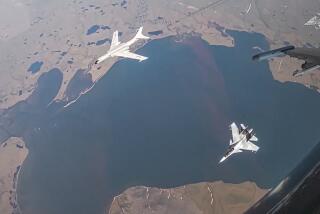If Tables Were Turned, We’d Do the Same
- Share via
The midair collision of a U.S. Navy EP-3 spy plane and a Communist Chinese fighter--plus the subsequent emergency landing of the EP-3 at a Chinese military base and the way the U.S.plane’s crew has been treated by the Chinese--prompts the obvious question: What would the U.S. do if the situation was reversed? What if a supersecret Chinese plane unexpectedly landed on Okinawa or Guam or Hawaii?
Although Western nations treat captured peacetime military men differently than Eastern nations do, you shouldn’t be surprised to learn that the U.S. would be doing much the same as the Chinese military is doing: The first concern would be safety. What if a saboteur or a terrorist rigged the plane with a nuclear device?
The plane would immediately be searched from top to bottom looking for explosives, chemical or biological weapons or other immediate hazards. Yes, this might look like an aggressive move, but it’s a necessary one.
The crew would also be taken into custody, separated and secured so no one could trigger a device or try to hurt anyone else.
The second concern would be the safety and security of the crew itself. What if someone on the flight crew wanted to defect? Each crew member would be individually searched, photographed, examined, questioned and given the opportunity to ask for asylum. An intelligence-trained doctor would be the perfect person to bring in at this point because military men often trust and confide in physicians and nurses in times of stress or crisis.
If no one on the crew appeared to want to defect--this assessment could take a few days--then it would be a good idea to reunite a few of them. Naturally, the room would be bugged. Two or more crewmen would eventually start talking, and the information might be useful.
Give them plenty of food and water, and they will talk even more as they relax. Never put the older men in with the younger ones because the older military men will quickly educate the younger troops in how to behave when in enemy custody. Always put men of equal rank together--it is more difficult to rebuild a chain of command than if an obviously higher-ranking officer is present.
The plane would get a thorough examination by trained intelligence officers and engineers, even if it meant dismantling it. Yes, the plane is some other nation’s property, but it would be in our territory, not by our invitation.
I would expect that in the case of the EP-3, the crew had already erased the classified information and destroyed the secret boxes, but there are ways to extract information out of even the most thoroughly smashed boxes--and of course you hope that the crew in their panic, excitement or incapacitation didn’t have time or forgot to destroy some key piece of equipment or memory bank.
Every book, manual, scrap of paper or piece of equipment on board the plane would have intelligence value. Even the tiniest bit of information would be a piece of a gigantic puzzle, and you would never know if the tiny piece you’re holding is the piece that makes the whole puzzle come together.
The EP-3 spy plane now in Chinese hands is several generations more sophisticated than anything in that country, so we can expect that our plane will be taken apart piece by piece and studied with great interest. It is an intelligence bonanza for the Chinese.
In China, the military’s influence in matters of state is considerably higher than in the West, so the fate of our EP-3 and its crew may not be resolved for quite some time. The military can demand as much time as it requires to collect information before succumbing to diplomatic pressure.
In the West, the diplomats can exert far more influence on the military, so the push would be on quickly for a peaceful resolution.
More to Read
Sign up for Essential California
The most important California stories and recommendations in your inbox every morning.
You may occasionally receive promotional content from the Los Angeles Times.













